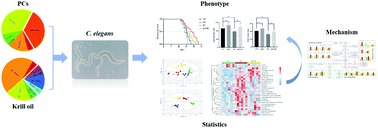The effect of krill oil on longevity and locomotion: a pilot study†
Abstract
Krill oil as a dietary supplement is popular with consumers. Several experimental and clinical trials have suggested that krill oil is beneficial for longevity and locomotion, but the underlying mechanisms for this have remained largely elusive. In this study, we investigated alleviation of impairment of Caenorhabditis elegans by polar compounds from frying oil with the use of krill oil. Observations of life span and locomotion demonstrated that the intake of krill oil increased median survival by 17.86%, head thrashes by 27.79% and body bends by 20.78% for impaired C. elegans. Metabolomic analysis revealed that krill oil could significantly restore the negative alterations caused by polar compounds, including upregulation of serine, tyrosine, palmitic acid and stearic acid, and downregulation of maltose 6′-phosphate, UDP-glucose, glutamic acid, phosphoserine and 25-hydroxyvitamin D3. Additionally, intake of krill oil also changed some metabolites that were irrelevant to impairment by polar compounds, but were beneficial for health for C. elegans. Metabolomics investigations indicated that krill oil ameliorates energy metabolism and alleviates oxidative stress and excitotoxicity caused by polar compounds on C. elegans. The data obtained in this study will facilitate future functional studies of krill oil.



 Please wait while we load your content...
Please wait while we load your content...